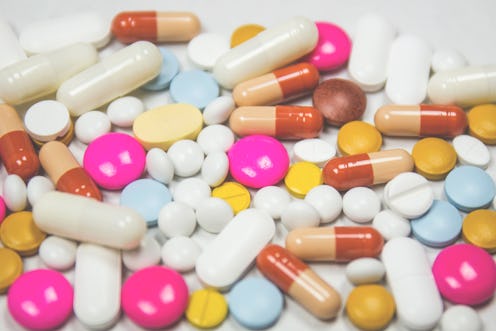Life
Polycystic ovary syndrome is a hormonal condition characterized by irregular periods, weight gain, fatigue, and infertility that can be debilitating for the people who deal with it. One in 10 women in the U.S. between 15 and 44 years old will be affected by the syndrome, according to the U.S. Department of Health and Human Services, but many women with PCOS don't realize they even have the condition. And according to a new study from researchers at Cardiff University in Wales, the syndrome may have another unfortunate side effect: People with PCOS are more likely to be diagnosed with mental health disorders, and the reason why is multifaceted.
During the new study, the researchers looked at more than 17,000 women who were diagnosed with PCOS and compared them to women who didn't have the condition. Those with PCOS were more likely to be diagnosed with depression, anxiety, and bipolar disorder. "Further research is needed to confirm the neurodevelopmental effects of PCOS, and to address whether all or some types of patients with PCOS are exposed to mental health risks," said lead author Aled Rees in a press release about the findings.
According to the researchers, once someone is diagnosed with PCOS, they should also be screened for mental illness — a finding that's consistent with our previous understanding about PCOS. Ronald D. Blatt, M.D., F.A.C.O.G. told Bustle earlier this year that PCOS "can cause depression, irritability, and anxiety."
Shahin Ghadir, MD., F.A.C.O.G, tells Bustle the symptoms of PCOS can cause mental health issues for women. "Many PCOS patients have signs and symptoms that lead to depression and self-esteem issues due to the fact that abnormal hair growth on a woman’s body and face, excess acne, male-pattern baldness, potential obesity, and abnormal menstrual cycles can lead to a female not feeling great about the way she looks," he says. Additionally, because PCOS is often associated with higher infertility, this can also trigger depressive symptoms among women with the syndrome. A 2012 article in the International Journal of Fertility & Sterility says the syndrome can have a negative impact on everything from self-esteem to your sex drive. "Many people feel ashamed of their PCOS and often try to hide it as they can sense other people's judgment," the author of the article wrote. "These women also may react by internalizing and accepting negative attitudes about themselves, and may increase unhealthy behaviors. Stigma against the condition itself may keep people from admitting they need counseling or other help. Sometimes the discrimination feels worse than the illness itself."
What's the biggest takeaway from this research? According to study authors, doctors should screen PCOS patients for mental health conditions once they've been diagnosed. Recognizing mental illness and starting treatment early can improve the prognosis of a patient and make the lives of those with mental illness easier.
"The effect of PCOS on mental health is under-appreciated," Rees said in the press release. "Our work shows that screening for mental health disorders should be considered during clinical assessments."
PCOS can be hard for doctors to diagnose because the symptoms vary so much from patient to patient — even the name can be misleading. PCOS stands for polycystic ovary syndrome, but not every woman with the condition even has ovarian cysts. Additionally, the symptoms are broad enough that they could point to something else entirely, like thyroid disorders or Cushing's syndrome. Once a woman is diagnosed, though, doctors should evaluate her mental health or refer her to a professional who can help. The condition is already tough to live with, so the increased risk of mental health issues sounds discouraging at first. If medical professionals use these findings as a chance to improve their diagnostic procedures, life could become slightly easier for people living with PCOS who also struggle with mental illness.
This article was originally published on
